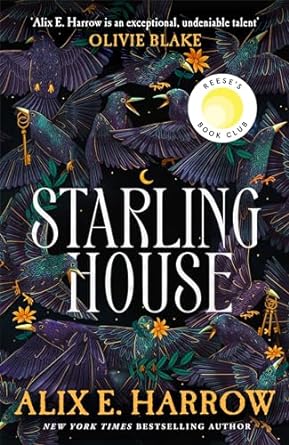Welcome to Eden, a gloomy, decaying former coal-mining town in Kentucky and a misnomer if there ever was one. All known coal deposits are mined out, and thanks to a coal-fired power plant, air quality is poor and the water tastes strange. Some of the denizens would leave for greener pastures, if they could.

Opal is one of those who probably couldn't. A high-school dropout with bad teeth, a menial job, and a history of delinquency, she and her younger brother Jasper have been orphaned for years after their mother died in a car crash that Opal survived. Seeing Jasper's performance in school and talent in filmmaking, Opal strives to pave a way out of Eden for him.
Since her mother's death, Opal has also been having dreams about a dilapidated old house partly covered in vines. But she knows the house in those dreams: Starling House, the home of a series of owners, the latest of whom is Arthur Starling, a surly recluse who never seems to venture out of its front gates.
From house to home
Inexplicably drawn to the house, Opal finally meets Arthur and manages to finagle a good pay as the place's housekeeper with the hope of sending Jasper to a good school somewhere far from Eden. But while she's not cleaning, fixing up parts of the house, or helping herself to the silverware, she finds odd things about the house, its history and ties to the town that will upend her life.
In essence, Alix E. Harrow's Gothic fantasy novel Starling House is about making dreams come true and finding a home in a place you live, and both of these might not be the same. But what if the home you've been dreaming of could be a haunted house with a dark past, the site of several mysterious deaths that the whole town avoids like the plague? With a sullen misanthrope of a landlord who tries so hard to be as unlikeable as possible?
Opal finds herself in that situation, but she makes the most of it. The pay is good and the tasks around the house are strangely fulfilling, but as time passes, she learns more about the house and Arthur's past and true role in that place – and the secrets he's been guarding about it – and must decide whether to leave or stick around. A decision complicated by her spying for a shadowy organisation eyeing the house and her changing feelings for its antisocial owner.
Brilliantly narrated tale
Harrow's prose is evocative, immersing the reader into the atmosphere of a dying American town. One could almost smell the stale air inside Starling House, hear the rumble of a train on its tracks, and feel the chill of the winter air as the mist brushes against bare skin and tugs on one's clothing. There is a place in the US state of Kentucky called Eden, and though it's unlikely to be the town in this novel, the depiction is sufficiently believable, even after elements of the supernatural are introduced.
The story seamlessly shifts between two viewpoints: Opal's, told in the first person, and Arthur's in the third person. The footnotes that provide seemingly redundant in-universe information appear redundant as well – until one reaches the end of this novel where everything finally makes sense.
If there are any complaints about this brilliant and engaging novel, is that the loose ends are tied up too neatly after so much gloom and drama. Also, Opal adapts rather quickly to changing situations with little disbelief or adjustment. And one is not sure the involvement of a clandestine agency investigating the secrets of the house is necessary.
Neither Opal or Arthur are lovable, but the audience can perhaps empathise with them. Both are orphans and products of unfortunate circumstances. Opal has had to, at times, resort to crime to survive, earn a living and care for her brother, while Arthur was left to shoulder an enormous burden at a young age. The two have also made poor choices, but one can hardly fault them for that. Opal's brusque interactions with Jasper (and later on, Arthur) have a certain tenderness to them that soften the edges of her character and the book.
Though the chilling truth about the house is eventually revealed, it does not prepare the reader for revelations about the widow and her ill-fated marriage, the siblings' own backgrounds and how their mother died. Each backstory falls like a hammer, driving home the gravity of each and proving that the scariest things do not lurk in the shadows of old houses.
Sounds interesting? Get Starling House here.




Comments (0)
There are no comments for this article. Be the first one to leave a message!